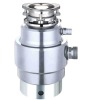Air switch control Low noise Overload protector Quick locking technology New design milling chamber with patent
A garbage disposal unit or waste disposal unit is a device, usually electrically powered, installed under a kitchen sink between the sink's drain and the trap which shreds food waste into pieces small enough—generally less than 2 mm (0.079 in)—to pass through plumbingGarbage disposal units are widely used in North American households, but far less commonly used elsewhere. In Canada, they are commonly called garburators.
Food scraps range from 10% to 20% of household waste, and are a problematic component of municipal waste, creating public health, sanitation and environmental problems at each step, beginning with internal storage and followed by truck-based collection. Burned in waste-to-energy facilities, the high water-content of food scraps does not generate energy; buried in landfills, food scraps decompose and generate methane gas, which is considered to be a potent greenhouse gas.
The premise behind the proper use of a disposal is to effectively regard food scraps as liquid (averaging 70% water, like human waste), and use existing infrastructure (underground sewers and wastewater treatment plants) for its management. Modern wastewater plants are effective at processing organic solids into fertilizer products (known as biosolids), with advanced facilities also capturing methane for energy production.
A high-torque, insulated electric motor, usually rated at 250–750 watts to 1 horsepower) for a domestic unit, spins a circular turntable mounted horizontally above it. Induction motors rotate at 1,400–1,800 RPM and have low starting torque; commutator motors rotate at higher speeds (about 2,800 rpm), have high starting torque, and are usually lighter. However commutator motors are noisier than induction motors, partially due to the higher speeds and partially because the commutator brushes rub on the slotted armature.The higher starting torque of those appliances with a permanent magnet motor ensures in most cases that there will be no blockage.
The added weight and size of induction motors might be of concern. Many models have some degree of sound insulation.
The turntable is surrounded by a shredder ring, which has sharp slots. The food waste sits on the turntable and through centrifugal force is forced to its perimeter and through the shredder ring. The turntable has a number of swiveling lugs—similar to little hammers attached to its topside—which assist in forcing the waste through the shredder. Except for special models, most of the food waste disposers do not have any sharp blades or scissors.
The Kitchen Food Waste Disposer/ Garbage Disposer D-451 1/2 HP 450W




